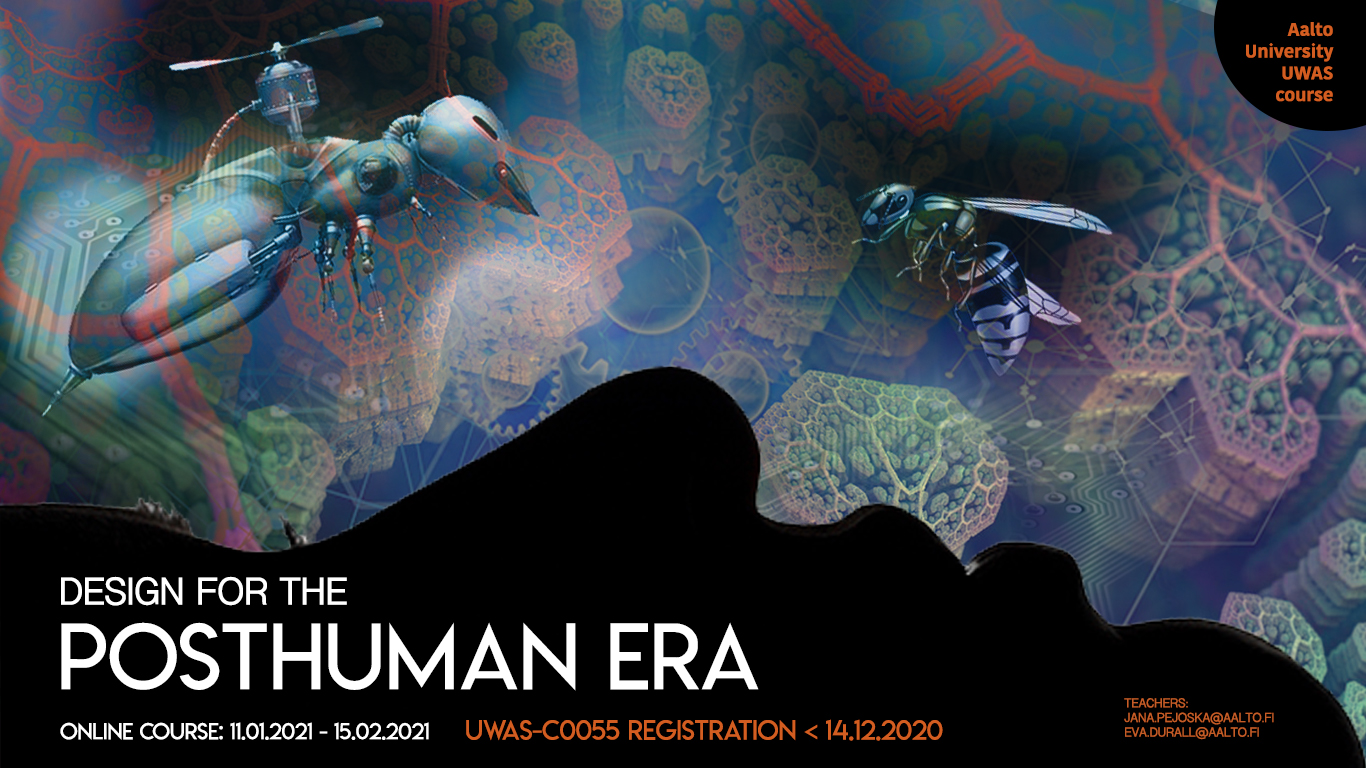
Please note! Course description is confirmed for two academic years, which means that in general, e.g. Learning outcomes, assessment methods and key content stays unchanged. However, via course syllabus, it is possible to specify or change the course execution in each realization of the course, such as how the contact sessions are organized, assessment methods weighted or materials used.
LEARNING OUTCOMES
Through this course, students are expected to:
- Become familiar with the philosophy of posthumanism
- Discuss the future role of the human, while considering also the nonhuman actors in a geopolitical, but also in an eco-philosophical manner
- Develop an understanding of theoretical frameworks focused on the relation between technology and humans, and their implications for the design of technology.
- Get acquainted with design thinking methods that foster creativity and alternative thinking.
- Critically reflect on the challenges and opportunities associated with the design of future technology.
- Gain a first-hand experience of technology design process
- Collaborate with others in order to solve a transdisciplinary design project.
Credits: 3
Schedule: 11.01.2021 - 15.02.2021
Teacher in charge (valid 01.08.2020-31.07.2022): Eva Durall Gazulla, Jana Pejoska, Tim Smith
Teacher in charge (applies in this implementation): Eva Durall Gazulla, Verna Kuusniemi, Jana Pejoska, Emilia Pennanen
Contact information for the course (applies in this implementation):
CEFR level (applies in this implementation):
Language of instruction and studies (valid 01.08.2020-31.07.2022):
Teaching language: English
Languages of study attainment: English
CONTENT, ASSESSMENT AND WORKLOAD
Content
Valid 01.08.2020-31.07.2022:
Throughout the history of thought, design and technology, technology has been frequently regarded as a way to transform the human condition. Current approaches like posthumanism question what does it mean to be human, while formulating new concepts around the human condition. These considerations of the roles of humanity in the environmental and socio technical sphere, provide a base from which we can reflect the current and future approaches to the design of technology. By understanding the types of agencies that these entities have, the designers or creators of new technologies can develop corresponding design methods and practices that better address the challenges that we face on the planet.
Throughout the course, participants will get familiar with theories of posthumanism, transhumanism, systems thinking and design thinking methods. Practical tools and methods for the design challenge will be offered for hands-on activities that help acquire a first hand experience on what it means to design technological systems where the distinction between humans and technologies is not that clear anymore.
Assessment Methods and Criteria
Valid 01.08.2020-31.07.2022:
Students will be evaluated based on their participation and input throughout the course. In addition, the group project which is expected to be presented at the end of the course will have a central role in the evaluation. This project will be assessed by peers and the teachers in charge. In order to ensure transparency on the evaluation criteria, students will have access to the rubric to assess their performance throughout the course.
Also, students will be asked to create a learning portfolio throughout the course. The learning portfolios are important tools for supporting reflection and capturing changes in the students’ thinking about the issues discussed during the course. Students will receive specific guidance for the elaboration of the learning portfolios, which will be inspired by self-ethnography methods.
Workload
Valid 01.08.2020-31.07.2022:
The total amount of hours of the course is 81h (3 credits). The work hours are distributed as follows:
- 16h of lectures
- 10 hours of individual work (reading and assignments)
- 45 hours of group work
- 10 hours of reflection
DETAILS
Study Material
Valid 01.08.2020-31.07.2022:
The study materials will consist in seminal works, recent publications and works from art, design research and practice, ethics of design and technology, as well as works from philosophy. Attention to diversity (gender, geographical context, format) will be paid to the selection of readings and materials.
Prerequisites
Valid 01.08.2020-31.07.2022:
None
SDG: Sustainable Development Goals
8 Decent Work and Economic Growth
9 Industry, Innovation and Infrastructure
11 Sustainable Cities and Communities
12 Responsible Production and Consumption
